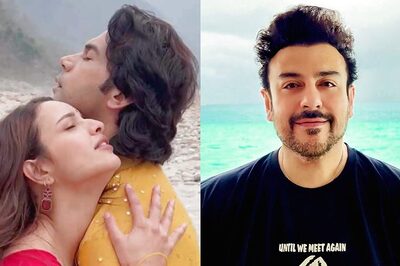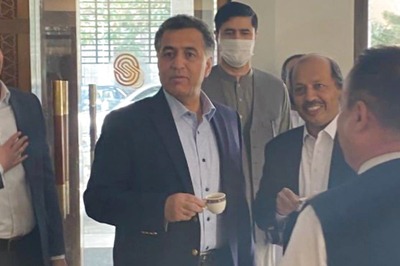
views
A UK court on Wednesday fixed December 10 as the date to deliver its verdict on whether beleaguered liquor baron Vijay Mallya can be extradited to India to face charges of fraud and money laundering amounting to around Rs 9,000 crores.
Marking the conclusion of the trial, Westminster Magistrates' Court Judge Emma Arbuthnot fixed December 10 as the date on which she expects to deliver her verdict.
"There is an awful lot to go over The most important point is the prima facie case," the judge said, indicating that other issues relating to prison conditions would be secondary.
Mallya has now been bailed to appear before the court on December 10, marking the conclusion of the year-long extradition trial which opened on December 4 last year.
The 62-year-old former Kingfisher Airline boss' defence team, led by Clare Montgomery, opened the day by branding the government of India's evidence presented in the case as "utterly unfounded".
The Crown Prosecution Service (CPS), arguing on behalf of the Indian government, countered this with arguments that Mallya had intended, from the outset, never to repay the loans he sought for his struggling airline and misrepresented its profitability.
"The government of India case that there was some secret pocket of knowledge about losses within Kingfisher Airlines (KFA) which were not revealed to the banks is utterly unfounded, said Montgomery.
"That this was a carefully thought out dishonest strategy knowing KFA was bound to fail is just nonsense. It was a financial disaster, not as result of dishonesty but the result of a failing airline failing to recover," she said, reiterating her earlier submissions that KFA was the victim of a wider financial crisis that hit the aviation industry.
She dismissed the CPS argument that there was stark disjoint between what Mallya knew and what the banks knew and also repeatedly accused the Indian authorities of leaving documents out of the bundle that prove that KFA was the victim of the economic climate and not any deliberate fault.
Mallya's defence team also rubbished the video of Barrack 12 at Arthur Road Jail in Mumbai, where the businessman is to be held if he was to be extradited to India, as having been freshly painted to give the perception of brightness that did not exist.
The video, submitted by the Central Bureau of Investigation (CBI) on Judge Arbuthnot's direction at the last hearing in July, was not played in open court as the judge said she had already reviewed it three times.
The video clearly shows the gloom that settles on this building, which is encased in what is effectively a steel oven, Montgomery said, as part of the defence arguments in favour of a court-led independent inspection of the jail cell to ensure it meets the UK's human rights obligations.
It is impossible to be satisfied about humane lighting and ventilation, she said, adding that it had been clearly tidied up for the purposes of the video as it did not match up with the photographs previously provided by the Indian authorities.
The judge, however, made it clear to the CPS that she did not require any further information in reference to the prison conditions awaiting Mallya in India.
As part of the closing submissions, Mallya's defence team effectively undertook a recap of the entire defence case, also repeating its claim that the case brought against the businessman was politically motivated.
It was alleged that the CBI had been forced to file charges and once again referred to a newspaper report against CBI chief Rakesh Asthana, which had claimed that he influenced the heads of the state-run banks and threatened them with reprisals if action was not taken against Mallya.
Mr Asthana has been solemnly sitting in court. If this were fake news, it could have been dealt with, Montgomery said.
The day-long hearing, which marks the effective end of the trial until the verdict in December, also heard the closing submissions by the CPS, which focussed on highlighting that the judge should rule in favour of extradition based on the weight of the evidence.
"The evidence is capable of sustaining an inference of dishonesty, said CPS barrister Mark Summers, adding that the government of India has proved that Mallya has a case to answer before the Indian courts.
Earlier on Wednesday morning, Mallya responded to the swarm of reporters gathered outside the court in his characteristic manner, saying the courts will decide.
As far as I am concerned, I have made a comprehensive settlement offer before the Karnataka High Court. I hope the honourable judges will consider it favourably; everybody gets paid off and I guess that's the primary objective, said Mallya, who has been on bail on an extradition warrant since his arrest in April last year and is fighting extradition to India.
He said the media should question the banks why they are not supporting him in his efforts to repay.
"I am certainly a scapegoat, I feel like a scapegoat. Both political parties don't like me," he said.
He sarcastically described the video of Barrack 12 at Mumbai's Arthur Road Jail, which has been prepared for him, as very impressive.
Mallya's defence team has presented a series of expert witnesses in an attempt to prove that he had no fraudulent intentions when he took out the loans for erstwhile Kingfisher Airlines. The CPS, on behalf of the Indian authorities, have sought to establish that he had no intentions to pay back those loans in the event of the airline's collapse.



















Comments
0 comment